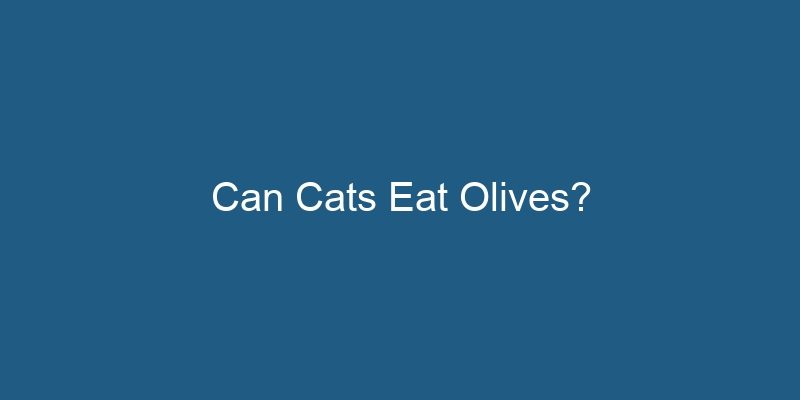Olives are a popular snack enjoyed by many humans around the world. They come in various types and sizes, and their distinct flavor adds a unique touch to many dishes. As a cat owner, you may wonder if it is safe to share this tasty treat with your feline companion. In this article, we will explore whether cats can eat olives and the potential risks and benefits associated with their consumption.
- 1. Are Olives Safe for Cats?
- 2. Nutritional Value of Olives
- 3. Risks of Feeding Olives to Cats
- 3.1. High Sodium Content
- 3.2. Digestive Upset
- 4. How to Safely Offer Olives to Your Cat
- 4.1. Remove Pits
- 4.2. Limit the Quantity
- 4.3. Observe Your Cat’s Reaction
- 5. Alternatives to Olives for Cats
- 5.1. Cooked Meat
- 5.2. Cat-Safe Fruits and Vegetables
- 5.3. Commercial Cat Treats
- 6. Frequently Asked Questions (FAQs)
- Can cats eat green olives?
- What happens if a cat eats an olive pit?
- Can cats eat black olives?
- Are olives toxic to cats?
- Can olives make cats sick?
- Can cats eat olive oil?
- Can olives be harmful to kittens?
- 7. Conclusion
1. Are Olives Safe for Cats?
When it comes to feeding human food to cats, it is essential to exercise caution. While some foods are safe for cats, others can pose serious health risks.
Fortunately, olives are generally safe for cats to eat in moderation. They are not toxic to felines and do not contain any specific substances that are harmful to them. However, it is important to note that cats have different dietary requirements than humans, and their bodies may not process certain foods as efficiently.
2. Nutritional Value of Olives
Olives are a good source of healthy fats, vitamin E, and minerals such as iron and copper. They also contain antioxidants, which can help protect the body against free radicals. However, cats have specific nutritional needs that are different from humans, and their bodies are not designed to rely on plant-based foods for essential nutrients.
While olives can provide some nutritional benefits, they should not be a significant part of a cat’s diet. Cats require a diet primarily composed of animal-based protein to thrive and meet their nutritional needs.
3. Risks of Feeding Olives to Cats
While olives are generally safe for cats, there are a few risks associated with feeding them to your feline friend:
3.1. High Sodium Content
Olives are typically brined or cured in saltwater, resulting in a high sodium content. Excessive sodium intake can lead to health issues in cats, such as dehydration, electrolyte imbalances, and even kidney problems. It is crucial to limit your cat’s consumption of salty foods, including olives, to prevent these potential complications.
3.2. Digestive Upset
Cats have sensitive digestive systems, and introducing new foods into their diet can sometimes cause gastrointestinal upset. If your cat consumes a large amount of olives or is not accustomed to eating them, it may experience symptoms such as diarrhea, vomiting, or stomach discomfort.
4. How to Safely Offer Olives to Your Cat
If you decide to share olives with your cat, it is important to follow these safety guidelines:
4.1. Remove Pits
Before offering olives to your cat, make sure to remove the pits. Olive pits can pose a choking hazard and may also cause digestive issues if ingested.
4.2. Limit the Quantity
Due to the high sodium content and the fact that olives should not be a significant part of a cat’s diet, it is advisable to offer them only as an occasional treat. A small piece of olive should suffice to satisfy your cat’s curiosity without exposing it to potential health risks.
4.3. Observe Your Cat’s Reaction
Every cat is unique, and individual reactions to new foods may vary. After giving your cat a small piece of olive, observe its behavior and monitor for any signs of digestive upset or allergic reactions. If your cat shows any adverse symptoms, it is best to avoid feeding olives in the future.
5. Alternatives to Olives for Cats
While olives may be safe for cats in moderation, they do not offer significant nutritional benefits for felines. Instead of sharing olives with your cat, consider offering these healthier alternatives:
5.1. Cooked Meat
Cats are obligate carnivores, meaning their bodies require animal-based protein to thrive. Cooked plain meat, such as chicken or turkey without seasoning or bones, can be a nutritious and enjoyable treat for your cat.
5.2. Cat-Safe Fruits and Vegetables
Some fruits and vegetables can be safe for cats in small quantities. Options like cooked pumpkin, steamed broccoli, or sliced apples (without seeds) can provide additional nutrients and variety in your cat’s diet.
5.3. Commercial Cat Treats
Commercially available cat treats specifically formulated for feline nutritional needs are a convenient and safe option. These treats are designed to provide balanced nutrition and can be an excellent way to reward your cat.
6. Frequently Asked Questions (FAQs)
-
Can cats eat green olives?
Yes, cats can eat green olives. However, it is important to remember that olives should be given to cats in moderation and without pits.
-
What happens if a cat eats an olive pit?
If a cat accidentally ingests an olive pit, it can pose a choking hazard or cause digestive issues. It is crucial to remove pits before offering olives to your cat.
-
Can cats eat black olives?
Yes, cats can eat black olives. However, as with any type of olives, they should be given in small quantities and without pits.
-
Are olives toxic to cats?
No, olives are not toxic to cats. However, excessive consumption of olives can lead to health issues due to their high sodium content.
-
Can olives make cats sick?
While olives are generally safe for cats, they can cause digestive upset if consumed in large quantities or if the cat is not accustomed to eating them.
-
Can cats eat olive oil?
Olive oil is not toxic to cats, and small amounts can be used as an occasional addition to their food. However, it should not be a significant part of their diet.
-
Can olives be harmful to kittens?
It is best to avoid feeding olives to kittens, as their digestive systems are more delicate and sensitive. Stick to a balanced diet specifically formulated for kittens.
7. Conclusion
In conclusion, while olives are generally safe for cats to eat in moderation, they should not be a significant part of their diet. The high sodium content and potential digestive upset associated with olives make them more suitable as an occasional treat rather than a regular food item for felines. It is essential to remove pits and monitor your cat’s reaction when introducing new foods. If you have any concerns about your cat’s diet or health, consult your veterinarian for personalized advice.










